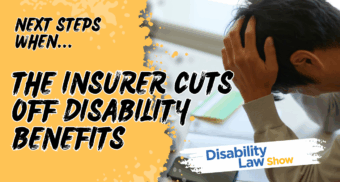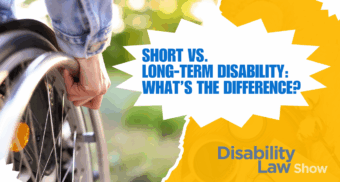Disability Law Show – Season 7 Episode 12
Episode Summary
HOW CAN YOUR MEDICAL TEAM STRENGTHEN YOUR LTD CLAIM on Season 7 Episode 12 of the Disability Law Show with Disability Lawyer and National co-managing Partner Sivan Tumarkin.
Watch above to discover the steps you must take when the insurance company cuts off or denies your long-term disability claim anywhere in Canada, on the only disability law show on TV and radio in the country.
Episode Notes
Mental health and disability benefits
My husband has been struggling with his mental health. Despite receiving treatment from a psychiatrist, the latest announcement of U.S. tariffs has worsened things. His mental health has deteriorated. Would he qualify for disability benefits?
- Invisible illnesses and disability leave: Mental health conditions qualify for short and long-term disability benefits. Despite the lack of physical evidence of a mental illness, an individual with an inability to perform the basic tasks of their occupation should receive benefits. The reason for a mental health condition should not determine eligibility for benefits.
✔ Is Mental Health a Disability in Canada?
✔ Invisible Disability in Canada: What It Means & Your Rights
“Frustration of contract” while on LTD
My friend was cut off from long-term disability after two years. Now his employer says he can no longer be employed because of ’frustration of contract.’ Does he have any options here?
- Employment and disability overlap: In some instances, employment and disability rights issues can overlap. It is common for individuals to be cut off preemptively from long-term disability benefits which can impact their employment position.
- Two-year mark on LTD: After two years on long-term disability, many claimants are cut off as the test to continue to receive benefits changes. After two years, claimants must prove they cannot work in any occupation due to their disability. Claimants can continue to receive disability benefits after the two-year mark if they are still unable to work.
How can your medical team strengthen your LTD claim
- Provide clear medical evidence: Doctors should provide clear medical evidence and reports detailing the impact of symptoms on a claimant’s inability to work. Medical reports should be concise and relevant to the claimant’s position.
- Regular medical visits: Claimants must continue to receive treatment from medical professionals. Keeping a record of medical visits and treatment strengthens disability claims as claimants must prove they are seeking appropriate treatment to abide by their policies.
- Reinforcement from a specialist: Specialists can often reinforce the need for claimants to receive disability benefits as they can offer secondary opinions on a medical condition, along with a general practitioner. Some types of illnesses or injuries require specialist intervention or opinions, such as rheumatologists, psychiatrists, etc.
Injury after car accident but denied disability
After a car accident where I suffered neck and spinal injuries, I’m on very heavy pain medication and struggle with mobility. I applied for long-term disability, but the adjuster has been slow to respond. The adjuster claims that because I’m still working, I’m not “totally disabled”. Is this true?
- Disability terminology: The phrase “totally disabled” or “total disability” was created by disability insurers. The phrasing is misleading as it ensures individuals consider the phrase outside of the context of long-term disability. To be “totally disabled” in the disabilty context, claimants must be unable to perform the essential tasks of their occupation.
Disability appeal taking months to resolve
I was diagnosed with Muscular Dystrophy months ago. The insurer denied my claim on the basis that my doctor was not explicit in his recommendation. I appealed the denial with the insurance company, but they have been dragging on the process for months. I am beyond frustrated.
- Appealing a denial of benefits: The appeals process typically is not successful. Often, claimants are appealing to the same adjuster who initially denied benefits. Appeals are rarely conducted by external third parties. The appeals process can take valuable time away from claimants hoping to receive benefits. Alternatively, individuals can file a disability claim to pursue benefits and are more likely to receive a response from their insurers.
PREVIOUS EPISODE: Disability Law Show S7 E11 – Guide to transitioning from short to long-term disability




